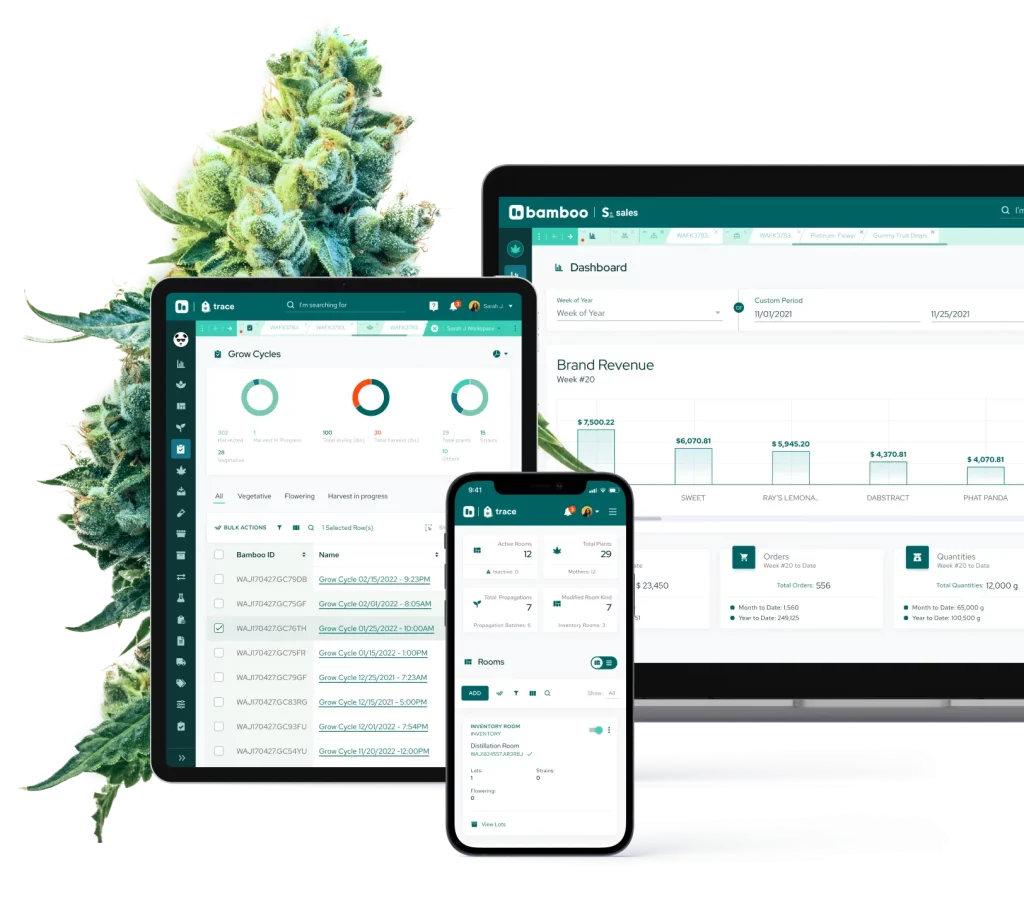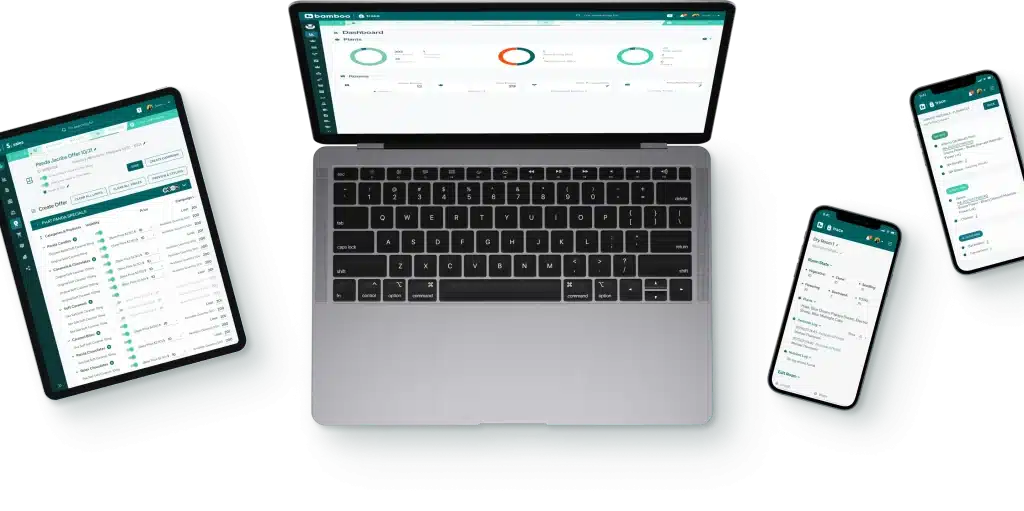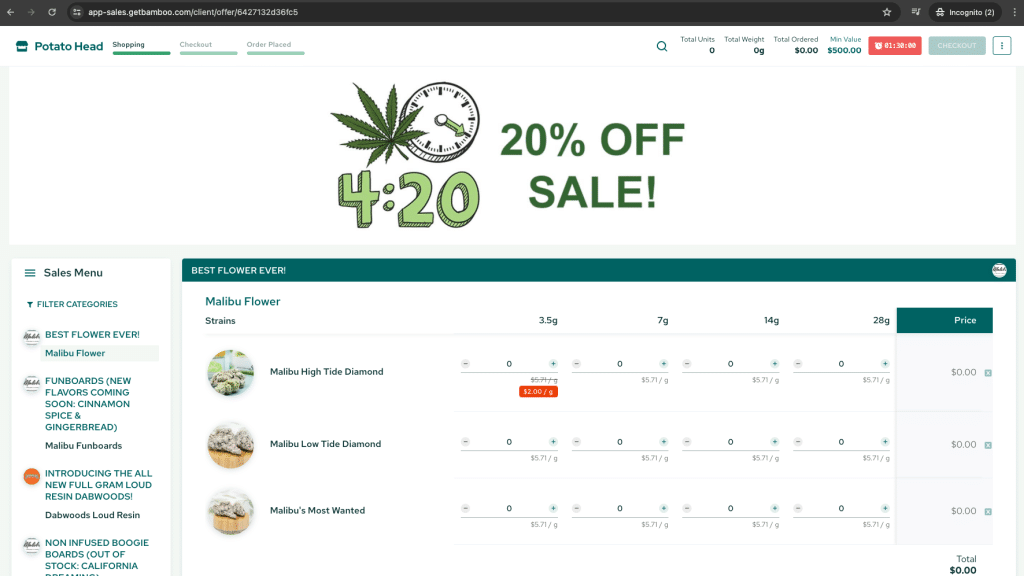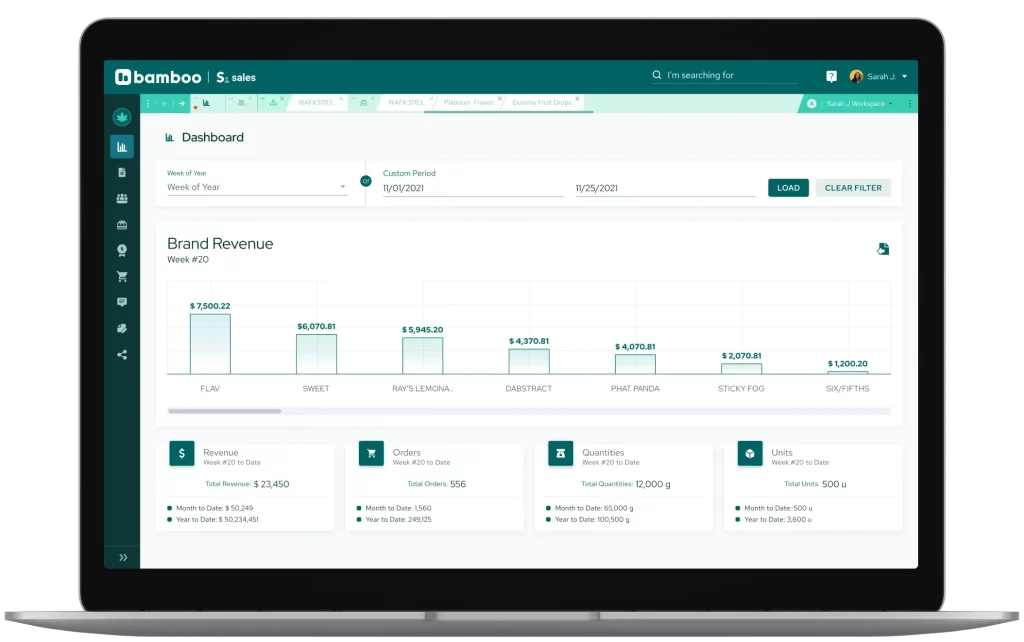Washington DC Seed to Sale Cannabis Software
Cannabis compliance in Washington DC can be a complex maze, but with Bamboo as your guide, navigating it becomes a breeze. Our platform seamlessly integrates with the District’s tracking system, ensuring your business stays compliant while streamlining operations, no matter your size.
Bamboo Trace and Bamboo Sales work together to optimize your entire supply chain, from seed to sale. With our intuitive tools and automated features, compliance is handled effortlessly, freeing you to focus on what matters most – growing your business and delivering exceptional products to your customers.
But Bamboo doesn’t stop at compliance. We understand that success in Washington DC’s competitive cannabis market requires a keen eye on profitability. Our platform arms you with the insights and tools you need to maximize your bottom line, from optimizing inventory management to driving sales growth.
Don’t let regulatory obstacles hinder your progress. Choose Bamboo as your partner and enjoy the peace of mind that comes with a fully compliant and thriving business. Our knowledgeable team is dedicated to supporting you every step of the way, enabling you to concentrate on providing top-quality products and services to your valued customers.
Unlock your cannabis business’s full potential with Bamboo – the intelligent choice for enterprises in Washington DC. Let us help you simplify compliance, boost profitability, and achieve long-term success in this dynamic industry.

Washington DC's Recreational Market
Washington, D.C. has a unique recreational cannabis market due to its status as a federal district. While the possession and cultivation of cannabis have been legal in D.C. since 2015, the sale of recreational cannabis remains illegal due to congressional restrictions on the city’s ability to regulate and tax cannabis sales.
Despite these limitations, the district has seen the emergence of a “gifting” economy, where businesses sell non-cannabis items like t-shirts, stickers, or artwork and include a “free” gift of cannabis with the purchase. This practice has created a quasi-legal market that operates in a gray area.
Here’s an overview of the situation:
- Gifting economy: The gifting loophole has continued to be used by businesses to provide cannabis to consumers, despite the lack of a regulated market.
- Enforcement: D.C. authorities have taken limited action against the gifting economy, focusing primarily on businesses that are operating too openly or causing public disturbances.
- Medical cannabis: The district’s medical cannabis program, which was established in 2010, continues to serve registered patients through licensed dispensaries.
- Calls for regulation: Advocates and some city officials have continued to push for the establishment of a regulated recreational cannabis market in D.C., arguing that it would provide a safer, more controlled environment for consumers and generate tax revenue for the city.
- Congressional obstacles: Efforts to establish a regulated market have been hindered by the Harris Rider, a congressional budget provision that prevents D.C. from using its funds to regulate cannabis sales.
The situation in Washington, D.C. likely remains largely unchanged, with the gifting economy continuing to operate in the absence of a regulated market. The future of D.C.’s recreational cannabis market depends on changes in congressional policy and the city’s ability to establish a legal framework for sales and taxation.
Washington DC's Road to Recreational Cannabis
Washington D.C., the nation’s capital, has a unique history with cannabis legalization due to its status as a federal district. Here’s a timeline of the key events in D.C.’s road to recreational cannabis:
- 1998: D.C. voters approved Initiative 59, which legalized medical cannabis. However, the U.S. Congress blocked the initiative from being implemented through the “Barr Amendment,” which prohibited D.C. from using funds to support the medical cannabis program.
- 2009: Congress lifted the Barr Amendment, allowing D.C. to move forward with implementing its medical cannabis program.
- 2013: D.C. Council approved the Marijuana Possession Decriminalization Amendment Act, which reduced penalties for possessing small amounts of cannabis.
- November 2014:
- D.C. voters overwhelmingly approved Initiative 71, which legalized the possession and home cultivation of recreational cannabis for adults 21 and older.
- The initiative did not include provisions for a regulated commercial market due to D.C.’s unique position as a federal district.
- February 2015:
- Initiative 71 took effect, allowing adults 21 and older to possess up to 2 ounces of cannabis, cultivate up to 6 plants (no more than 3 mature plants) at home, and gift up to 1 ounce of cannabis to other adults.
- Consumption of cannabis in public spaces remained illegal, and the initiative did not create a framework for licensed retail sales.
- 2015-Present: The U.S. Congress has included riders in annual spending bills that prohibit D.C. from using local funds to establish a regulatory framework for commercial cannabis sales.
- 2019-2022:
- D.C. Council members have introduced several bills to establish a regulated adult-use cannabis market, but these efforts have been hindered by the ongoing congressional restrictions.
- The Council has also focused on social equity initiatives, such as the Medical Cannabis Certified Business Enterprise Preference Program, which aims to promote diversity in the medical cannabis industry.
- Future Developments:
- The future of recreational cannabis sales in D.C. largely depends on Congress lifting the restrictions on the district’s ability to regulate commercial cannabis activity.
- If the restrictions are removed, D.C. policymakers would likely move quickly to establish a regulated adult-use market, building upon the existing medical cannabis program and the limited legalization enacted through Initiative 71.
Washington D.C.’s unique status as a federal district has created a complex landscape for cannabis legalization. While adults can legally possess and cultivate cannabis for personal use, the lack of a regulated commercial market has led to the emergence of a “gray market” and has limited the potential economic and social benefits of legalization.
As the nation’s capital, D.C.’s approach to cannabis policy holds symbolic importance and has the potential to influence the ongoing national debate about cannabis legalization. Advocates continue to push for congressional action to remove the restrictions on D.C.’s ability to establish a well-regulated adult-use market that prioritizes social equity, public health, and safety.
Traceability, Compliance & Regulation in Washington DC
Metrc and Traceability, Compliance & Regulation in Washington DC:
As Washington DC has not yet established a regulated commercial cannabis market, the city does not currently use Metrc or a similar seed-to-sale tracking system. However, the District does have a medical cannabis program with its own set of regulations and compliance requirements.
Medical cannabis regulation in Washington DC:
✔ Licensing: The Alcoholic Beverage Regulation Administration (ABRA) oversees the licensing of medical cannabis businesses, including dispensaries, cultivators, and testing laboratories.
✔ Patient registration: Patients with qualifying medical conditions can register with the DC Department of Health to obtain a medical cannabis card.
✔ Seed-to-sale tracking: While not using Metrc specifically, Washington DC requires medical cannabis businesses to track inventory and sales through a seed-to-sale tracking system.
✔ Testing: All medical cannabis products must be tested by licensed laboratories for potency, contaminants, and other quality control measures.
✔ Packaging and labeling: Medical cannabis products must be properly packaged and labeled with information about the contents, potency, and any necessary warnings.
In the event that Washington DC establishes a regulated recreational cannabis market in the future, it is likely that the city will implement a more comprehensive seed-to-sale tracking system, such as Metrc, to ensure compliance and prevent diversion of cannabis products into the illicit market. The specific regulations and compliance requirements for a recreational market would be determined by the legislation passed and the rules developed by the responsible regulatory agency.
Tired of cannabis marketplaces?
Generic marketplaces won’t cut it in D.C.’s competitive cannabis industry. To succeed, you need Bamboo – the revolutionary platform that showcases your unique brand and delivers tailored experiences to buyers.
With Bamboo, you can create custom menus that highlight your top products and guide buyers towards your most profitable offerings. Our intuitive tools help you differentiate your brand and forge lasting customer relationships in D.C.’s dynamic market.
Take charge of your brand’s image, outshine competitors, and drive engagement and bigger sales with Bamboo’s innovative features, designed specifically for D.C.’s cannabis businesses.
Invest in custom sales menus and strategies to unlock long-term growth and customer satisfaction. Bamboo empowers you to navigate D.C.’s complex cannabis landscape with confidence.
Join the Bamboo revolution and experience personalized sales success in the Nation’s Capital. Our experts will elevate your brand and help you achieve unparalleled growth in D.C.’s booming cannabis market.
Transform your strategy and dominate D.C.’s cannabis industry with Bamboo. Contact us now to get started and take your brand to new heights in this exciting market.
Bamboo Trace
✔ Quick-action buttons available in every module for swift navigation and action execution.
✔ Simplified traceability through real-time two-way synchronization with Washington DC’s seed-to-sale system (Metrc).
✔ Receive instant notifications for important updates and events.
✔ Work in offline mode, accessible on both mobile and desktop devices, especially useful during periods of downtime in Metrc API systems.
✔ Ability to support multiple licenses for comprehensive management of operations.
✔ Customize label templates to meet Washington DC’s Metrc regulations and efficiently generate multiple labels for various plant and product requirements.
✔ Comprehensive management of Strains, Rooms, Propagations, Grow Cycles, Plants, Harvests, Disposals, Inventories, Conversions, QA Samples, and more, all integrated within Bamboo Trace.
✔ Effortlessly process orders and generate manifests in just minutes for enhanced efficiency.

Bamboo Sales
✔ Utilize the finest Sales Menus available in Cannatech for enhanced sales strategies.
✔ Seamlessly integrate Sales Menus with your website for expanded reach and accessibility.
✔ Simplify email marketing efforts with the built-in feature tailored for sending sales menus effortlessly.
✔ Gain insights through comprehensive sales analytics and reporting on clients, sales reps, and customizable metrics.
✔ Generate numerous recommended orders (proposals) to cater to diverse client needs.
✔ Customize Real-time Sales Menus according to preferences and branding.
✔ Easily manage discounts, credits, pricing tiers, and distribution lists for streamlined operations.
✔ Efficiently handle all your sales enablement strategies within the Bamboo Sales platform.

